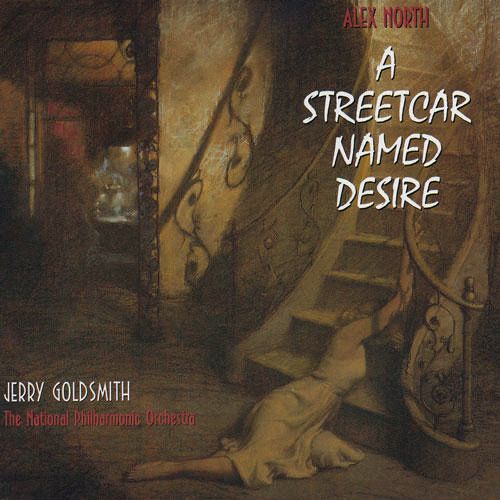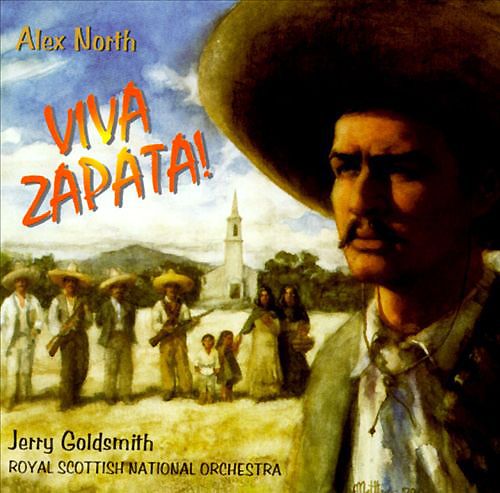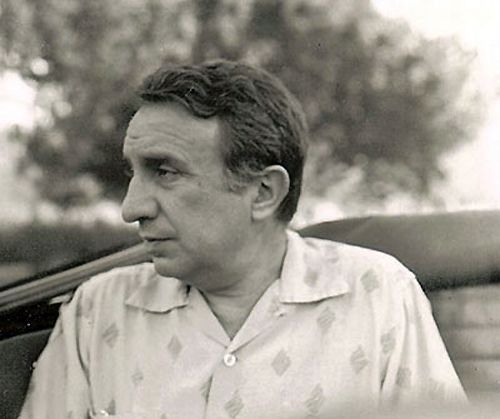wimpel69
11-20-2013, 05:03 PM
The sharing of these albums has ended. No more requests and no re-ups of my rips, please!
A Streetcar Named Desire is a 1951 American film adaptation of the 1947, Pulitzer Prize winning
stage play by Tennessee Williams. Williams collaborated with Oscar Saul on the screenplay and Elia Kazan
who directed the stage production went on to direct the film. Marlon Brando, Kim Hunter, and Karl Malden,
all members of the original Broadway cast, reprised their roles for the film. Vivien Leigh, who had
appeared in the London theatre production, was brought in for the film version in lieu of Jessica Tandy,
who had created the part of Blanche DuBois on Broadway.
A Streetcar Named Desire holds the distinction of garnering Academy Award wins for actors in three out
of the four acting categories. Oscars were won by Vivien Leigh, Best Actress, Karl Malden, Best Supporting
Actor, and Kim Hunter, Best Supporting Actress. Marlon Brando was nominated for his performance as
Stanley Kowalski but, although lauded for his powerful portrayal, did not win the Oscar for Best Actor.
Brando's performance has since been cited as one of the most influential performances in the history of
American Cinema and has been widely credited for being one of the first performances to introduce
Method acting to Hollywood moviegoers.
The film is also noteworthy for being the first film to honor actors in both the Best Supporting Actor
and Best Supporting Actress category. It has since been labeled by the American Film Institute as one
of the greatest American movies of all time and subsequently selected for preservation in the
United States National Film Registry by the Library of Congress as being "culturally, historically,
or aesthetically significant" in 1999.
Viva Zapata! is a 1952 biographical film starring Marlon Brando and directed by Elia Kazan.
The screenplay was written by John Steinbeck, using as a guide Edgcomb Pinchon's book, Zapata
the Unconquerable, a fact that is not credited in the titles of the film. The cast includes Jean Peters
and, in an Academy Award-winning performance, Anthony Quinn. The movie is a fictionalized
account of the life of Mexican Revolutionary Emiliano Zapata from his peasant upbringing, through
his rise to power in the early 1900s, to his death. To give the film as authentic a feel as possible,
Kazan and producer Darryl F. Zanuck studied the numerous photographs that were taken during the
revolutionary years, the period between 1909 and 1919 when Zapata led the fight to restore land
taken from the people during the dictatorship of Porfirio D�az. Kazan was especially impressed with
the Agustin Casasola collection of photographs and he attempted to duplicate their visual style in
the film. Kazan also acknowledged the influence of Roberto Rossellini's Paisan.

Music Composed by
Alex North
Played by the
National Philharmonic Orchestra
Conducted by
Jerry Goldsmith
Tracks:
1. Main Title (01:23)
2. New Orleans Street (01:29)
3. Belle Reve Reflections (02:15)
4. Stan Meets Blanche (03:03)
5. Blanche and Mitch (03:43)
6. Stan and Stella (03:01)
7. Blanche (02:43)
8. Belle Reve (02:50)
9. Birthday Party (03:09)
10. Revelation (05:12)
11. Mania (02:00)
12. Soliloquy (03:50)
13. Seduction (04:31)
14. Della Robia Blue (02:52)
15. The Doctor / Affirmation (04:16)
Total Time: 46'17

Music Composed by
Alex North
Played by the
Royal Scottish National Orchestra
Conducted by
Jerry Goldsmith
Tracks:
1. Foreword (00:33)
2. Main Title (01:57)
3. Zapata (01:12)
4. Zapata's love and Children's Episode (02:29)
5. Innocente's Death (02:10)
6. Gathering Forces (03:50)
7. Huerta (04:09)
8. Pablo (02:22)
9. Conscience (01:16)
10. Morelos (01:34)
11. Eufemio (04:31)
12. Josefa's Love (01:42)
13. Josefa (01:27)
14. End Title and Cast (02:41)
Total Time: 31'53

The sharing of these albums has ended. No more requests and no re-ups of my rips, please!
A Streetcar Named Desire is a 1951 American film adaptation of the 1947, Pulitzer Prize winning
stage play by Tennessee Williams. Williams collaborated with Oscar Saul on the screenplay and Elia Kazan
who directed the stage production went on to direct the film. Marlon Brando, Kim Hunter, and Karl Malden,
all members of the original Broadway cast, reprised their roles for the film. Vivien Leigh, who had
appeared in the London theatre production, was brought in for the film version in lieu of Jessica Tandy,
who had created the part of Blanche DuBois on Broadway.
A Streetcar Named Desire holds the distinction of garnering Academy Award wins for actors in three out
of the four acting categories. Oscars were won by Vivien Leigh, Best Actress, Karl Malden, Best Supporting
Actor, and Kim Hunter, Best Supporting Actress. Marlon Brando was nominated for his performance as
Stanley Kowalski but, although lauded for his powerful portrayal, did not win the Oscar for Best Actor.
Brando's performance has since been cited as one of the most influential performances in the history of
American Cinema and has been widely credited for being one of the first performances to introduce
Method acting to Hollywood moviegoers.
The film is also noteworthy for being the first film to honor actors in both the Best Supporting Actor
and Best Supporting Actress category. It has since been labeled by the American Film Institute as one
of the greatest American movies of all time and subsequently selected for preservation in the
United States National Film Registry by the Library of Congress as being "culturally, historically,
or aesthetically significant" in 1999.
Viva Zapata! is a 1952 biographical film starring Marlon Brando and directed by Elia Kazan.
The screenplay was written by John Steinbeck, using as a guide Edgcomb Pinchon's book, Zapata
the Unconquerable, a fact that is not credited in the titles of the film. The cast includes Jean Peters
and, in an Academy Award-winning performance, Anthony Quinn. The movie is a fictionalized
account of the life of Mexican Revolutionary Emiliano Zapata from his peasant upbringing, through
his rise to power in the early 1900s, to his death. To give the film as authentic a feel as possible,
Kazan and producer Darryl F. Zanuck studied the numerous photographs that were taken during the
revolutionary years, the period between 1909 and 1919 when Zapata led the fight to restore land
taken from the people during the dictatorship of Porfirio D�az. Kazan was especially impressed with
the Agustin Casasola collection of photographs and he attempted to duplicate their visual style in
the film. Kazan also acknowledged the influence of Roberto Rossellini's Paisan.

Music Composed by
Alex North
Played by the
National Philharmonic Orchestra
Conducted by
Jerry Goldsmith
Tracks:
1. Main Title (01:23)
2. New Orleans Street (01:29)
3. Belle Reve Reflections (02:15)
4. Stan Meets Blanche (03:03)
5. Blanche and Mitch (03:43)
6. Stan and Stella (03:01)
7. Blanche (02:43)
8. Belle Reve (02:50)
9. Birthday Party (03:09)
10. Revelation (05:12)
11. Mania (02:00)
12. Soliloquy (03:50)
13. Seduction (04:31)
14. Della Robia Blue (02:52)
15. The Doctor / Affirmation (04:16)
Total Time: 46'17

Music Composed by
Alex North
Played by the
Royal Scottish National Orchestra
Conducted by
Jerry Goldsmith
Tracks:
1. Foreword (00:33)
2. Main Title (01:57)
3. Zapata (01:12)
4. Zapata's love and Children's Episode (02:29)
5. Innocente's Death (02:10)
6. Gathering Forces (03:50)
7. Huerta (04:09)
8. Pablo (02:22)
9. Conscience (01:16)
10. Morelos (01:34)
11. Eufemio (04:31)
12. Josefa's Love (01:42)
13. Josefa (01:27)
14. End Title and Cast (02:41)
Total Time: 31'53

The sharing of these albums has ended. No more requests and no re-ups of my rips, please!